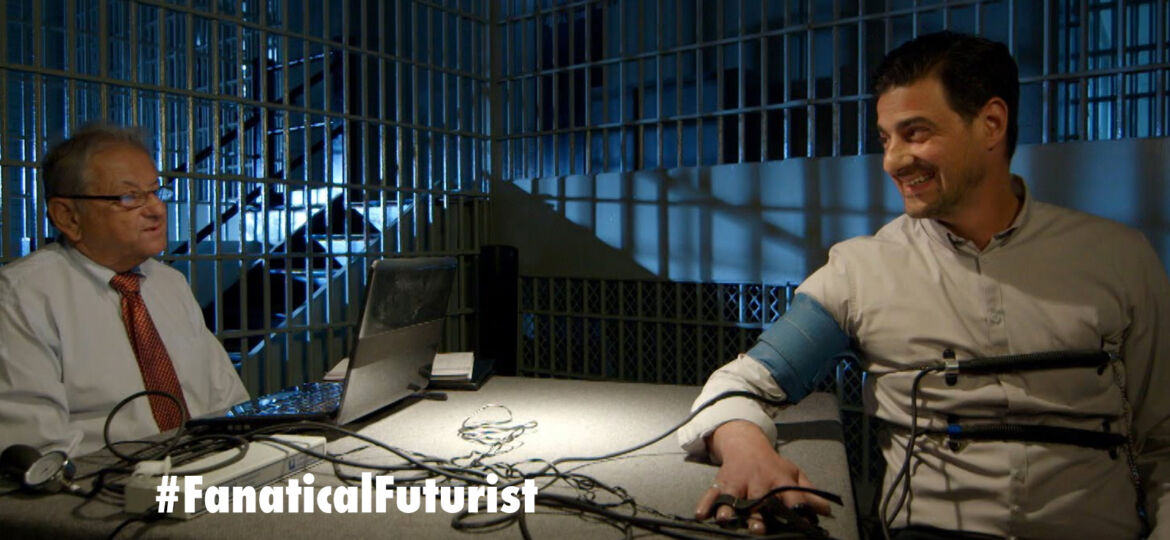
WHY THIS MATTERS IN BRIEF
Being able to tell when someone is lying is important, but as with any technology authorities will have to know where to draw the line between just cause and violating a person’s rights to privacy.
Scientists have long known this, our pupils widen ever so slightly when we’re being deceptive, but the change is so minor, just fractions of a millimetre, that the average person never notices, but now a Utah based company called Converus is using Artificial Intelligence (AI) that uses a camera to track a persons eyes to sense deception, and it’s already gaining popularity and replacing polygraph tests, which has long been the gold standard for detecting lies. And the use cases for the technology are endless, from finding cheating spouses and aiding border control agents to helping investors figure out if a CEO is lying about something on his or her earnings calls, and there’s no reason why this technology couldn’t eventually find its way into the pre-crime technology arsenal that’s grown substantially this year.
“The eyes are the window of the soul,” said Juan Becerra, an investigator at Panther Security and Investigations. Becerra used to work with polygraphs at the FBI and now uses EyeDetect, “this is something that’s revolutionary and that’s going to change the entire deception detection field.”
EyeDetect, which is already being used to help during job interviews and corporate investigations, as well as being used to tell if bank tellers can be trusted, has an accuracy approaching 90 percent, putting it on a par with the famous polygraph tests, and that, for most organisations, is good enough.
At the moment a person taking an EyeDetect exam has to sit at a desk and answer true or false questions while an infrared camera tracks their eye movement, blinking rate and pupil dilation, and after 30 minutes, it scores their deceptiveness on a scale from zero to 100. And ultimately one day, as imaging and sensor technologies advance there’s little reason why this same technique couldn’t be put into a range of surveillance systems, say for example at airports or other sensitive areas.
EyeDetect’s algorithms weigh a variety of factors, but the key indicators are if a person’s eyes dilates while reading a question, and how fast they read questions.
“Our pupils dilate when we’re deceptive because lying takes more mental energy, and the eyes allow in more light and information to help our brains with their added workload,” says Becerra.
This evolved as a survival instinct, according to David Raskin, a retired University of Utah professor, who worked on the team that developed the science behind EyeDetect.
The Utah researchers found that a deceptive person will generally take longer to answer questions on a test, as they’re being careful, but that on the specific questions they’re lying on, they will respond faster.
Raskin and the other Utah professors, a group of leading polygraph researchers who gravitated toward optical tests for deception, said there are several advantages to sensing lies through the human eyes. Polygraph exam results can be biased because humans administer and score the tests but EyeDetect removes the human element. For example, an administrator may be fond of an applicant and go easy on them during questioning or ask tougher questions that make the person feel uncomfortable, which can skew the results, which means that as a result polygraph administrators must train for three to four months. By comparison an EyeDetect exam is overseen by a proctor who undergoes training for half a day.
Ken Roberts, a deputy sheriff in the Dona Ana County Sheriff Department in Las Cruces, New Mexico, has switched from administering polygraphs to EyeDetect exams for pre-employment screenings, says he still some uses for polygraphs though, such as interviewing a suspect in a homicide case, when tailored follow-up questions are necessary.
As for what’s next, well now a new version of EyeDetect is under development that lets customers give the tests orally instead of visually, and there’s no reason why that never version couldn’t be embedded into callcenter software to figure out when someone’s lying or telling the truth.
“A lot of the polygraph industry feels very threatened and protective [of their existing method of work]. They think it’s going to replace them,” Raskin said, “and who knows, maybe in the future it will.”
















